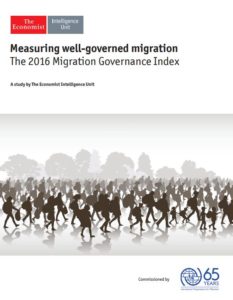Migration index to shine light on policy
The first ever index measuring the quality of national migration programs has been published by the International Organisation for Migration (IOM).
Still in its pilot phase, the Migration Governance Index (MGI), developed by the IOM and The Economist Intelligence Unit, is a tool to assist governments in examining the comprehensiveness of their policies while helping them identify gaps in order to prioritise when building institutional capacity and devising programs on migration.
 The project involves the development of a policy benchmarking framework to assess the extent to which national migration policies facilitate orderly, safe and well-managed migration.
The project involves the development of a policy benchmarking framework to assess the extent to which national migration policies facilitate orderly, safe and well-managed migration.
Fifteen countries have been selected for a pilot project, all of which reflect a diverse range of migration contexts ranging from countries of origin, destination, and transit to migration contexts in transformation.
The index designers’ intention is to demonstrate that it is possible to synthesise and compare such complex policy areas for countries in very diverse migratory contexts; and also to indicate that the sustainable development goals (SDGs) are not only a challenge for developing countries to achieve, but for all countries.
The IOM says the MGI is not a ranking exercise.
“Unlike many indices, the MGI is not merely a list of countries to be ‘named and shamed’ into faring better than their neighbours,” IOM spokesman David Martineau said.
“Rather, the MGI must be understood as a tool that can help national governments understand specifically where their challenges and strengths lie, and how to effectively measure progress over time. Thus, the MGI can be better understood as a gap analysis tool,” Mr Marinteau said.
The MGI’s methodology is not final. In its current state, the MGI uses five policy domains to assess participating countries including: institutional capacity; migrant rights and integration; migration management; labour, economics and investment; and regional and international cooperation and partnerships.
The IOM and EIU say they expect to change and improve the methodology with consultations in all regions of the world.
“Furthermore, we intend to put together an expert group that consists of representatives of member states, scholars and migration experts to discuss how the methodology could be improved,” Mr Martineau said.
“A very important and current component missing from the MGI to date is related to crisis migration. The team would most likely like to see this component incorporated in the second phase of the report.
“For years, IOM has sought to develop a clear, all-encompassing definition of good migration governance. With the adoption of the UN’s 2030 Sustainable Development Goals, the timeliness for such a definition became critical,” he said.
Laurie Nowell
AMES Australia Senior Journalist












